- At least ten people are killed after Russian rockets hit a building in Donetsk, according to a Ukrainian official.
- Canada says it will return to Germany the Russian turbine needed to maintain the Nord Stream 1 gas pipeline. Ukraine had lobbied against the move saying it would weaken Western sanctions on Russia.
- Ukrainian President Volodymyr Zelenskyy has dismissed Kyiv’s ambassador to Germany as well as several other top foreign envoys.
- The United States promises to provide nearly $368m in further humanitarian aid to Ukraine.
- Ukraine says Russian troops are pursuing “relentless” shelling on its eastern Donetsk region.
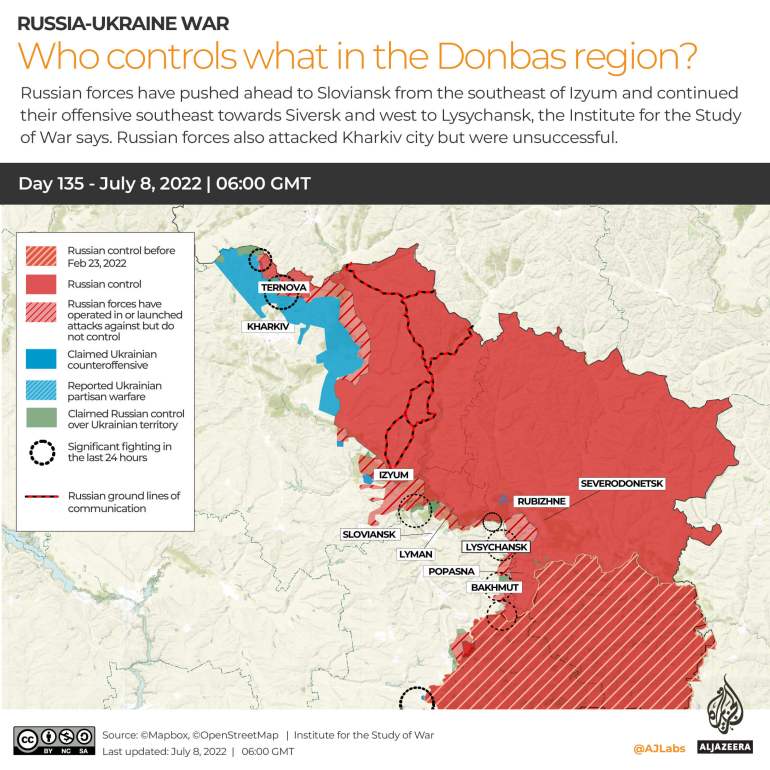
Here are all the latest updates:
Death toll after strike on east Ukraine building hits 15: rescuers
Rescuers have recovered 15 bodies after a Russian missile strike hit a residential building in Chasiv Yar town, eastern Ukraine, according to officials, increasing the death toll the third time since the morning.
“During the rescue operation, 15 bodies were found at the scene and five people were pulled out of the rubble,” alive, the local branch of the Ukrainian emergency service said on Facebook, adding that rescuers were in contact with three people alive under the rubble.
Russia hits hangars storing US-made artillery weapons
Russian forces struck two Ukrainian army hangars storing US-produced M777 howitzers, a type of artillery weapon, according to Russian defence ministry.
The hangars are located near Kostantinovka in the Donetsk region, the defence ministry said.
Ukraine: 10 dead in rocket attack on apartment building
Number of people killed in the Russian rocket attack that destroyed a five-story apartment building in the eastern Donetsk region has increased to 10, according to officials.
Pavlo Kyrylenko, governor of the Donetsk region, said about three dozen people could be trapped in the rubble. Rescuers have made contact with two people who are under the wreckage, he said on the Telegram messaging app.
The Ukrainian emergency services initially gave a death toll of six, but later said it has risen to 10. They did not say how many people may still be in the rubble.
Russia restricts access to website of German daily Die Welt
Russia has restricted access to the website of Germany’s Die Welt newspaper at the request of prosecutors, according to the country’s communications regulator.
Russian officials accuse the West of spreading false information about what Moscow over its invasion of Ukraine.
Since sending troops to the neighbouring country on February 24, Russia has blocked or limited access to BBC, Voice of America, Deutsche Welle and other media outlets.
Zelenskyy sacks several Ukrainian envoys
Ukrainian President Volodymyr Zelenskyy has said that he dismissed several of Kyiv’s senior envoys abroad, including the country’s outspoken ambassador to Germany.
Zelenskiy announced the sacking of Ukraine’s ambassadors to Germany, India, the Czech Republic, Norway and Hungary and said new candidates were being readied for the positions.
“This rotation is a normal part of diplomatic practice,” he said in a statement.
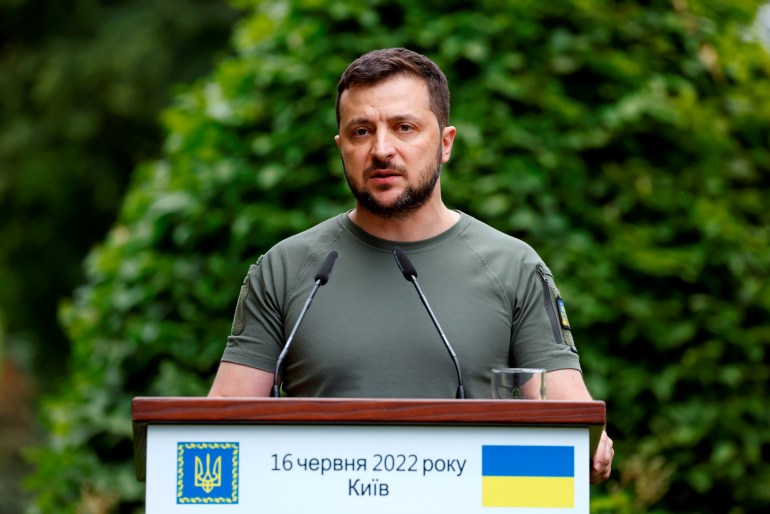
Russian rocket attack kills six in Donetsk: Official
At least six people have been killed and more than 30 are feared trapped after Russian Uragan rockets brought down a five-storey apartment block in the Donetsk region, according to an official.
Governor Pavlo Kyrylenko said on Telegram that the strike took place on Saturday evening in the town of Chasiv Yar.
He said six people had been confirmed killed and five wounded, and that according to information from residents, at least 34 people were likely trapped in the ruins.
Russian gas cutoff most likely scenario: French FM
French Finance Minister Bruno Le Maire has said a cutoff of Russian gas shipments is currently the most likely scenario.
“Let’s prepare for a cut off Russian gas. Today it’s the most likely scenario,” he told a business and economics conference in southern France.
Russia intends to annex part or all of Kharkiv region: Think-tank
A US-based research institute is warning that the Russian government has broader territorial aims than capturing Ukraine’s Donbas and likely intends to annex part or all of the north-eastern Kharkiv region.
The Institute for the Study of War (ISW) based its assessment on statements by Russia-backed authorities in the region claiming Kharkiv is an “inalienable part of Russian land”.
It said the Russia-backed authorities made the claim while unveiling a new flag for the region, which contained the Russian imperial double-headed eagle and symbols from the 18th century Kharkiv coat of arms.
It added, “The Kharkiv Oblast occupation government’s speed in establishing a civilian administration on July 6 and introducing martial law in occupied Kharkiv Oblast on July 8 further indicates that the Kremlin is aggressively pursuing the legitimization and consolidation of the Kharkiv Oblast occupation administration’s power to support this broader territorial aim.”
Navigation resumes on Danube-Black Sea Canal
Ukraine’s Ports Authority has said that ships carrying agricultural products can now use the Bystroye Canal that links the Danube River with the Black Sea.
The move was made possible by the Ukrainian recapture of Snake Island from the Russians, it said.
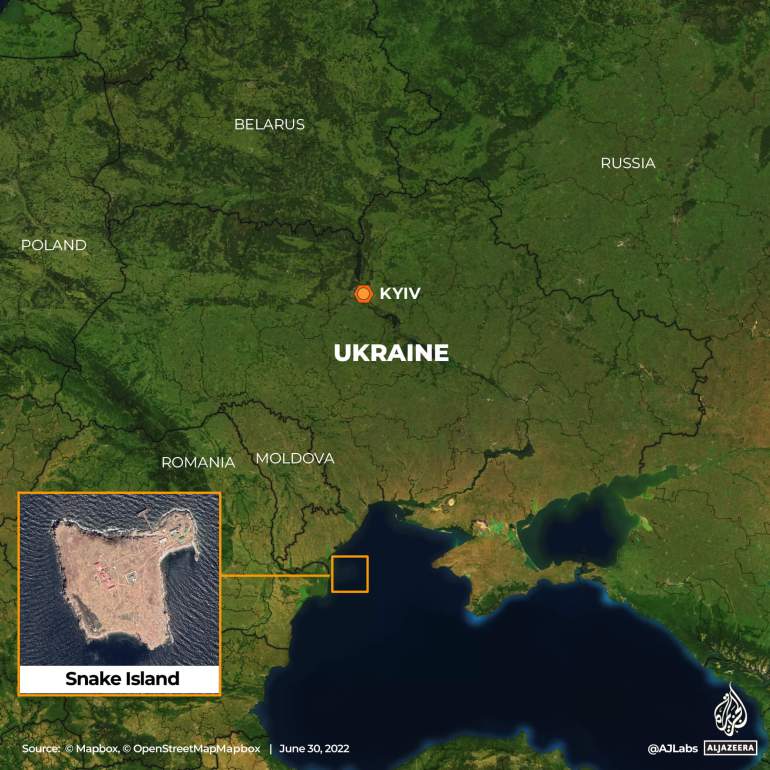
Ukrainian soldiers begin UK training programme
The United Kingdom has announced the start of a new military programme that aims to train up to 10,000 Ukrainian soldiers in the coming months.
In a statement, it said the first cohort of Ukrainian participants has now arrived in the UK.
“Using the world-class expertise of the British Army we will help Ukraine to rebuild its forces and scale-up its resistance as they defend their country’s sovereignty and their right to choose their own future,” said British Defence Secretary Ben Wallace, who visited the training programme this week.
The training will give volunteer recruits with little to no military experience the skills to be effective in front-line combat. Based on the UK’s basic soldier training, the course covers weapons handling, battlefield first aid, fieldcraft, patrol tactics and the Law of Armed Conflict.
Anger over Canadian decision to return repaired turbine
The Ukrainian Canadian Congress has denounced the Canadian government’s decision to return a repaired Russian turbine to Germany for maintenance on the Nord Stream 1 gas pipeline.
Alexandra Chyczij, national president of the Ukrainian Canadian Congress, said in a statement, “Our community is deeply disappointed by the Canadian government’s decision to bow to Russian blackmail.”
He said Canada is setting “a dangerous precedent that will lead to the weakening of the sanctions regime imposed on Russia”.
Canada to return repaired Russian turbine
Canada has decided to return to Germany a repaired Russian turbine that is needed to maintain the Nord Stream 1 gas pipeline.
“Canada will grant a time-limited and revocable permit for Siemens Canada to allow the return of repaired Nord Stream 1 turbines to Germany, supporting Europe’s ability to access reliable and affordable energy as they continue to transition away from Russian oil and gas,” said Natural Resources Minister Jonathan Wilkinson.
“Absent a necessary supply of natural gas, the German economy will suffer very significant hardship and Germans themselves will be at risk of being unable to heat their homes as winter approaches,” he said in a statement.
The decision came after Russia’s Gazprom cut capacity along the Nord Stream 1 pipeline from Russia to Europe to just 40 percent of usual levels last month, citing the delayed return of equipment being serviced by Germany’s Siemens Energy in Canada, and not market conditions amid the Ukraine war.
Germany wants Canada to return the turbine to Gazprom, but Ukraine had urged Ottawa to keep the turbine, saying a return would violate sanctions on Moscow.
The turbine would be sent to Germany first, which will then deliver it to Russia’s state-controlled Gazprom, a government source told the Reuters news agency earlier this week.
Sacking of envoys ‘normal part of diplomatic practice’: Zelenskyy
Ukraine’s president says the dismissal of several of the country’s senior ambassadors was a rotation that was a “normal part of diplomatic practice”.
It was not clear if the envoys would be assigned new positions.
Those sacked included Ukraine’s ambassadors to Germany, India, the Czech Republic, Norway and Hungary.
Hello and welcome to Al Jazeera’s continuing coverage of the Russian invasion of Ukraine.
Read all the updates from Saturday, July 9, here.











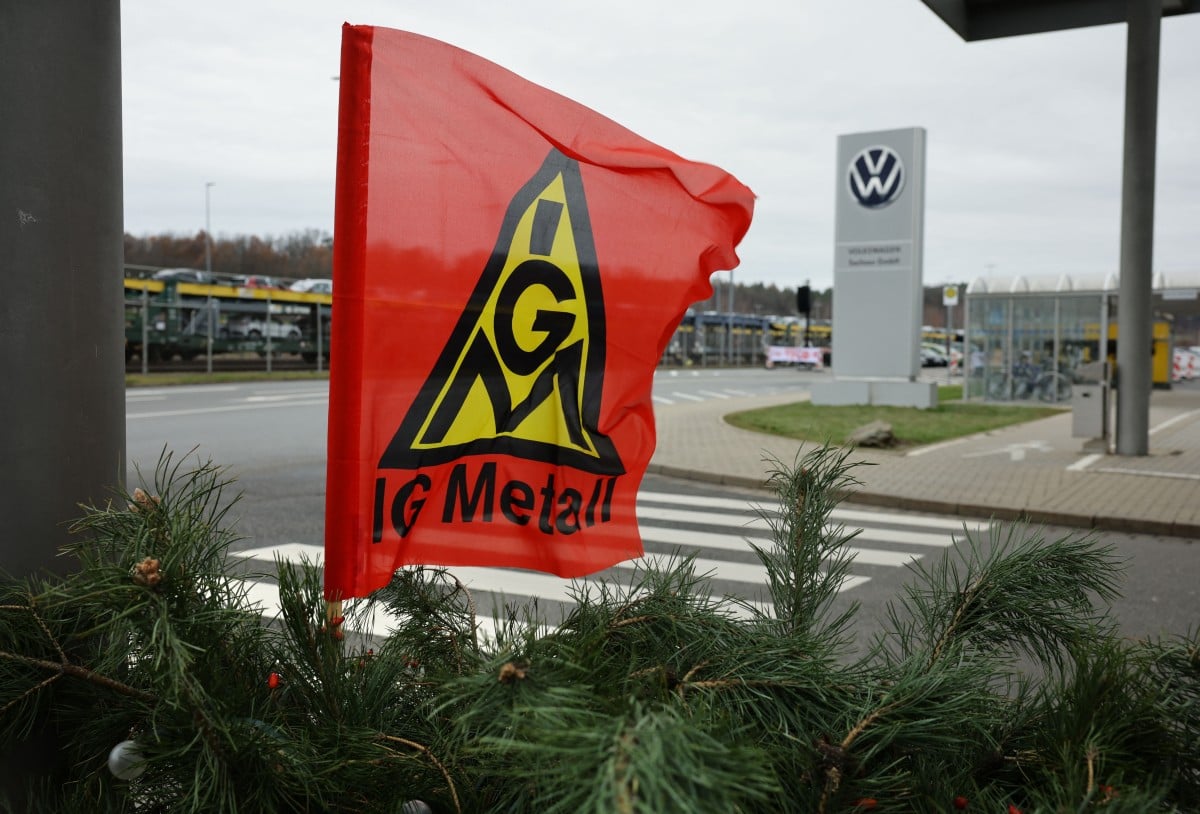


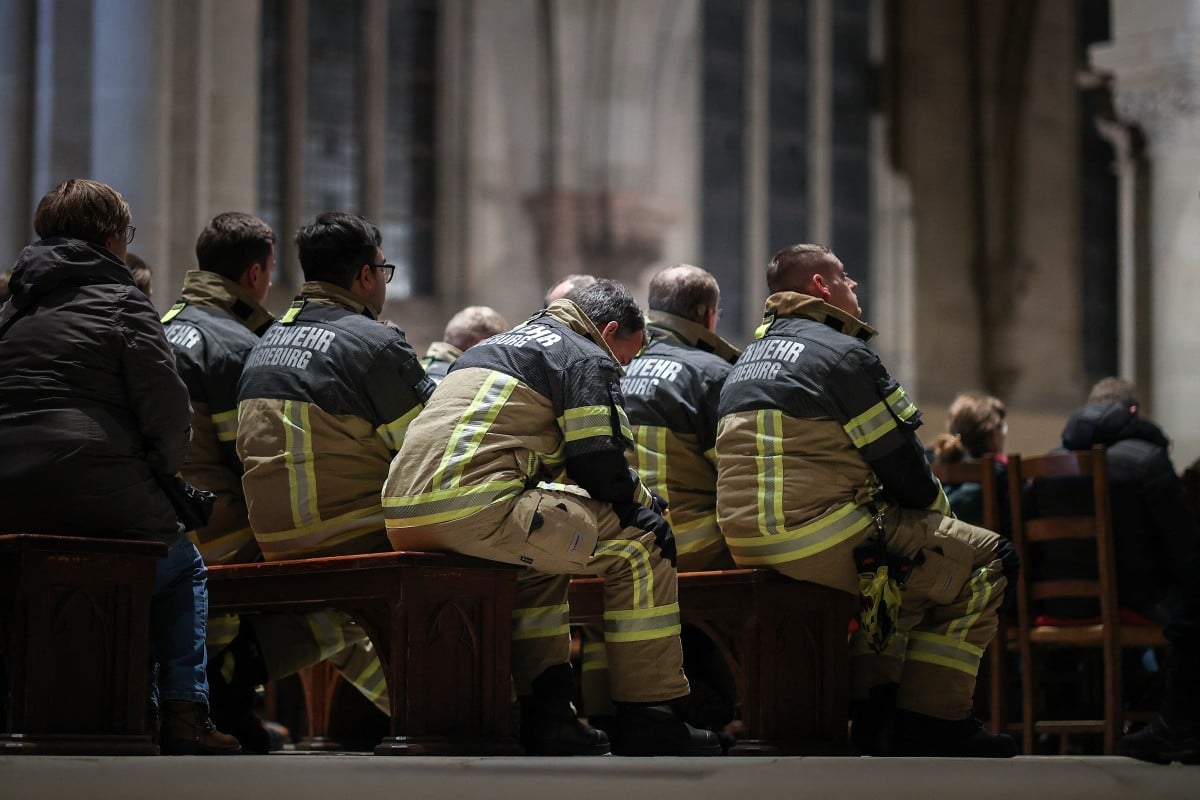
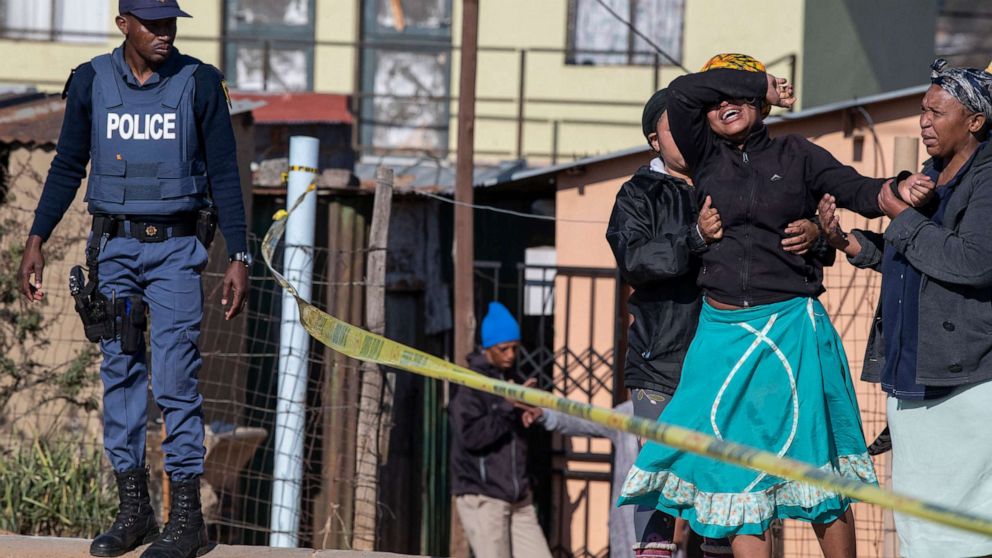





Discussion about this post